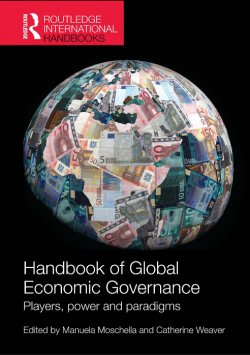Book
Routledge, 2013.

Since the start of the global financial crisis the global economic regime has been in turmoil. Following the massive failures in financial regulation, the collapse of global trade negotiations and persistent development challenges in the wake of world-wide food and financial crises, political and public attention has been focused on the task of rethinking the fundamental ideas and rules that govern the global economy. This Handbook aims to make sense of these emerging trends. The expert authors explore the interplay of players, powers and paradigms to discern and explain key patterns of continuity and change in critical areas of global economic governance, attempting to answer a number of key questions:
Who is playing a central role in global economic governance?
What are the sources of material and social power that enable actors to demand or assume positions of governing authority, define agendas and write and enforce the rules of the game?/li liWhat paradigms do these actors bring to the table?/li /ul pThis Handbook brings together contributions from leading scholars to analyze the governance of global trade, finance and development. Specifically, the book explores the patterns of continuity and change in the players, powers and paradigms that shape the global economy. Highlighting the multiple channels through which the lsquo;three Psrsquo; shape global governance in different areas of economic activity, the contributions in this Handbook also explore the challenges to legitimacy, relevance and effectiveness that we observe in global economic governance today. !--EndFragment--/p
Research Topic
Economic Policy

